Why we should support small fishing boats over super-trawlers, Part 1
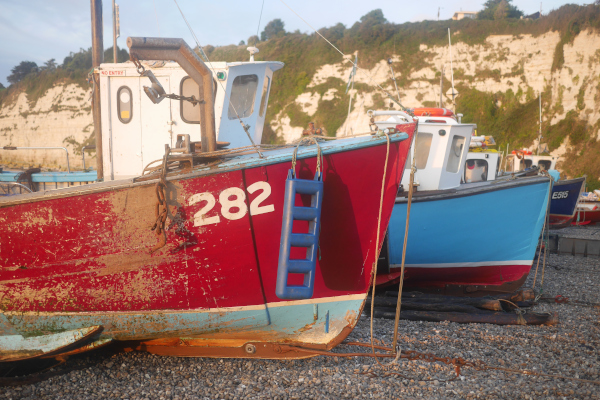
Here’s Part 1 of our interview with Caroline Bennett, founder of ‘Sole of Discretion’, a community interest company that sells fish caught by a collective of small fishing boats in Devon. Here we’re talking about the sustainability and community benefits of small fishing boats, the barriers that they face, and how her business can help you support them.
In Part 2 we’ll talk more about the life of small fishing boat skippers, and in Part 3 we’ll look at how government quotas benefit super-trawlers and disadvantage the small boats.
Today I’m talking with Caroline Bennett of Sole of Discretion. Hi Caroline
Good morning
You’re a co-operative selling fish caught by small fishing boats in Devon. Is that right?
Yes, we’re based in Plymouth and we’re a community interest company, owned by the fishing community. Although we’re based in Plymouth, we take fish from as far east as Eastbourne.
We bought a fish box from you – a ‘family fish box’. We’re very happy with it. 10 packs, a range of different fish – wild salmon, sea bass, mackerel, cod and flounder. It works out at around 2.75 per portion, which is great value, and the fish is high quality. We did get some polystyrene, but I think we can get eco-packaging next time.
It’s £1.50 more per delivery, but all the packaging is made from card.
We promote not just sustainability, but also community. We’re all about sustainable ways for people to get what they need, and ways that people can help decentralise the economy, both in what they consume and how they work. So we’re very interested in supporting small fishing boats. Tell me about Sole of Discretion – why did you set it up? what’s your motivation?
I love your anarchic approach – it’s great. I came to it through my environmental concerns. I was quite dismissive of the fishing community at the beginning. I was worried about the impact that eating fish was having on the marine environment. Then I came across an organisation called Slow Food, helping small producers in the food industry. Through them I found a small fisher on the Lizard in Cornwall, and he showed me the benefits of the small-scale fishing fleet. Slow Food showed me that you can’t have a protected environment without engagement from humans. I came very late to the game in understanding that people need protecting too. I thought it was just the planet that needed protecting.
What was your background before that?
I owned a Japanese restaurant (and still do), which is why I got so into fish. I absolutely loved bluefin tuna. I lived in Japan, and when I got back I opened the UK’s first conveyor belt sushi restaurant. Japanese food is easily available now, but it wasn’t then.
I lived in Japan for a year too. Bluefin tuna was becoming endangered, but I couldn’t find any concern for that in Japan. What’s happening with bluefin tuna now?
Still pretty endangered. But there’s international co-operation now, and at least in our seas, like the Mediterranean, it’s not continuing to fall in numbers.
When did you launch Sole of Discretion?
In 2016.
And how’s it doing?
It was a struggle. I saw that it was easier for a restauranteur to get ethically-sourced fish than a retail consumer. Friends knew I knew about fish, and were constantly asking me where to go to buy ethically-sourced fish. I didn’t actually know – it’s a complicated subject. So it was to plug that gap. You have to make it easy for people.
Yes, I think there’s a relatively small percentage of people who will go out of their way to do something for sustainability or community, but for the vast majority it has to be really easy, and not more expensive.
How does the business work?
There are 3 good fish auctions in the south-west – Newlyn, Brixham and Plymouth. And the Plymouth one especially, seemed to be working for the fishermen. In Eastbourne they were at the mercy of the wholesale markets, and the fishermen were getting squeezed. We had a few problems with delivery partners, and were struggling, but then Covid happened, and business boomed, because people could buy from us online.
I’m hoping there might be a few silver linings.
People were forced to look beyond their local supermarkets for food, and that was an encouraging sign. Less encouraging is that a large chunk of them have now gone back to their old shopping habits. How as a community do we capture those people who were prepared to give us a go when they had to, but dropped us when they didn’t? How do we make it attractive to shop locally? Pre-Covid, local food was talked about more than it was practised. During Covid it was practised more
We used to get fish box from a guy who lived near us in south London. He used to drive to the small fishing towns with a van, and drop fish at pick-up point in south London. It was great. You never knew what you were going to get. It could be crab, shellfish, we had John Dory. We gutted and scaled them ourselves, and learnt how to cook them. It was an adventure. Plus we knew we were helping the small fishing fleet.He was a lovely guy, but maybe not the best businessman in the world. I’m glad to have found you. We want to buy a range of different fish, from small fishing boats.
how do you define a small fishing boat? how do they compare in size to the big ones?
There’s a government definition – ten metres and under. So we stick with that definition. Although there are around 2500 vessels in England, and 500 larger ones. But they only get 4% of the quota.
I wanted to come to quotas later.
OK. But what small-scale means to me is a lower impact on the environment. Nothing is perfect, but the effect boats have on the sea bed is key for me. Even small-scale trawlers – their equipment is so light that they can’t do the damage that the bigger boats do.
10 metres is tiny isn’t it?
It’s measured under the water, which makes it difficult. Some newer boats can be tiny under the water, and then expand above the water. It’s not a perfect system, but where do you draw the line. So we’ve decided to stick with the government definition of a small boat.
The smaller boats are more carbon-efficient too. I always assumed that bigger boats have economies of scale. So per kilo of fish caught, you’d have thought they’d be using less fuel. But actually the complete opposite is true. Some of the most damaging large-scale fisheries can use up to 20 litres of fuel per kilo of fish caught, whereas the small-scale boats use between 2 and 5. That’s still bad, so I wonder what we can do to make fishing more sustainable in that respect.
I guess if you live close to the sea, you can go fishing yourself with a rod and line.
Exactly.
So we’ve talked about carbon, and about damage to the marine environment. But I’ve heard the argument that they’re more difficult to regulate, and so the government don’t know what they’re doing exactly, so they might be less sustainable than the big boats. What do you think about that argument?
I bet a big boat owner came up with it. When quota changed, back in the 90s, the government was caught on the hop about just how many small boats there were. They had no idea. Of course it’s easier to monitor fewer vessels, or fewer giant, monoculture farms, than it is to monitor a disparate group of small-scale farmers or fishers. The government would prefer to throw fewer resources at something, and that requires a consolidation of production. So it’s not unique to fishing.
But you believe that in terms of carbon and habitat destruction, small boats are preferable?
Yes – and also in terms of discards. The small fleet discards virtually nothing. Hugh Fearnley-Whittingstall brought the discard problem to the attention of the European Parliament, probably ten years ago now.
Then there’s the social equality issue as well. The small boats are owned by the skippers, whereas with the large boats, it’s distant shareholders; and you know that the localisation of the economy is very important. A Canadian marine biologist called Daniel Pauly collects stats on small versus large fishing fleets. He found that they use less fuel; they use fewer subsidies from taxpayers; they use less damaging sea bed equipment; they discard virtually nothing; and they provide just as much fish to consumers. This isn’t what the government or the industrial fishing fleet want you to know. They want you to believe that without these big boats, we’d all starve.
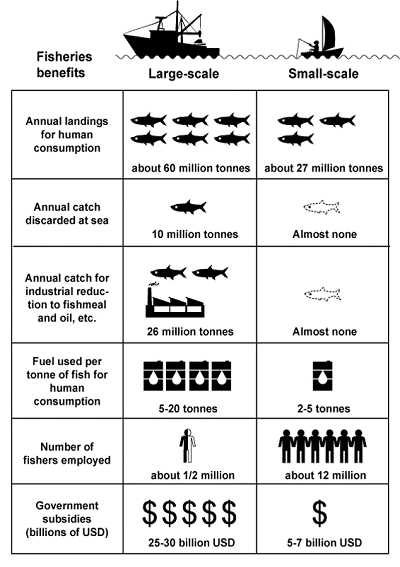
Highlights
- Small boats’ equipment is so light that they can’t do the damage that the bigger boats do; plus there are far fewer discards.
- The smaller boats are more carbon-efficient too. I always assumed that bigger boats have economies of scale. So per kilo of fish caught, you’d have thought they’d be using less fuel. But actually the complete opposite is true.
- Then there’s the social equality issue as well. The small boats are owned by the skippers, whereas with the large boats, it’s distant shareholders; and you know that the localisation of the economy is very important.
The views expressed in our blog are those of the author and not necessarily lowimpact.org's
8 Comments
-
1Chris September 5th, 2021
Location, location, location – or that should really be – distribution, distribution, distribution! There aren’t enough people able, or willing to distribute the small fishing boat catches! SO, how do inlanders get the sustainably caught fish?
I remember a splendid scheme whereby a sailing boat would collect olive oil from producers on the Iberian Peninsula and sail it back to U.K. Very sustainable and eco friendly, except a lot, if not most olive oil is produced Med. side of Spain and that involves another 1000 miles of sailing, if you don’t use the canals!
Back to distribution again, and regrettably this is the downfall of local producers. U.K. is discovering this at the moment with no truck drivers!
Maybe this shortage of long haul distribution will kick start local markets . . . . .
-
2Mike Eaton September 5th, 2021
To my mind there are several different but interlinked factors in this argument. In no particular order we have the environmental situation in that the more use of so called fossil fuels and the fumes and gases they give off (to say nothing of other problems) damaging the earth in various ways thus use of such should where possible be reduced to a minimal if not stopped completely. Looking at the consumption of such fuels the use by the larger vessels is neither sustainable nor sensible in any form. Conversely the smaller fishing boats world wide use much less. It could be reduced even further if (as happens in other parts of the world) the vessels propulsion uses other means. The use of wind power as a means of propulsion can and should be given immediate thought! this can be done by using smaller boats, the larger vessels whilst they could use sail would find many reasons that would and could make this awkward at least. In the use of some form of power I agree that a certain amount of power would make it safer for the vessels crews (navigation etc.) and better for the catch in general (the use of freezing/cooling the catch at sea reduces the spoilage of the fish involved) the use of most of that equipment in the smaller vessel would be mostly by using electricity – a small generator would use minimal fuel whereas with the larger vessel the generation of electricity would require appreciably larger generators and thus the use of more fuel in comparison considering the catch/fuel ratio.
I will now move on to the use of fishing gear used, generally either miles of nets or very large trawls for the larger vessels – both of which can and do cause appreciable damage to the environment, both the seabed and the use of synthetic lines and nets which if left tend to escape and drift on for many years still fishing as it drifts, but as nobody admits to owning these nets etc the fish is left to rot or be consumed by other fish that in turn become captive. The use of natural fibres rot fairly quickly so if they do break adrift will quickly break up and return to nature from whence it came. Added to this the use of nets which is basically a non elective from of catching (especially in the trawling system where normally a large net bag is dragged across the sea bed or close to it and picks up everything it meets. the use of hooks and lines tends to be more selective in that rocks and other non desired items are left where they are and only fish actually baited for will take up the bait and be caught.
Finally let us come to the amount of people employed within the industry (for now never mind the extras – the oil workers who supply the fuel, the canners and shippers who pack the fish in saleable forms and deliver it to the customers and most importanly the many small local shops of various kinds that sell other goods to the fishers in the trade – the bakers, the tailors, the candlestick makers etc) The larger vessels (the so called super trawlers) use failly small crews in comparison to the amount of fishers through out the world to catch, process and deliver to the central points for onward shipment (as is shown in the table aabove). The smaller boats with between one to four of a crew, go fishing from smaller ports and in some cases straight of the beach, sell a small amount locally and move the remainder on to various fish markets for onward shippment. One other thing – don’t forget that once the national “fast food” of these islands was the locally caught fish and chips! Caught locally, processed by people you know and in general does a lot for the local environment! It seems these days we prefer some highly spiced form of food from far away places (more fuel etc used to deliver) generally produced in some factory and heated up locally under conditions of which we know very little nor can we find out – OK they may have certain certificates to prove they follow certain guidelines but do they? They don’t know you and you don’t know them except as a source of money so why care, as long as the money keeps coming in?
My idea is that fish should be caught by local vessels with local people onboard and owned by local people only thus giving some pride to the community. To enable this the vessels need to be small with small crews, powered primarily by natural occuring fuels (sail) using primarily lines to catch those fish – I agree that there are certain methods (primarily static) where the net is required more than the line – crab and lobster fisheries for a start that need a different approach – and please get rid of fish farms – fish are designed to roam free not live on top of their own effluent! OK a bit long I know but it is I’m afraid a subject dear to my heart – standing by for incoming
-
3Sarah Rees September 5th, 2021
Well done Caroline! We sell Sole of Discretion fish through http://www.fromefoodhub.co.uk every fortnight! I am pleased to support this low impact sustainable venture…the fish are delicious…and not as costly as you would imagine…like meat I see fish as a treat these days…and where better to get your fish from than someone like Sole of Discretion…
-
4Dave Darby September 5th, 2021
Chris – yes, we got some olive oil from them – and I blogged about them – https://www.lowimpact.org/how-we-got-olive-oil-from-a-small-farm-in-portugal-brought-over-in-a-sailboat-by-a-co-operative-based-in-brighton-and-how-you-can-do-the-same/
Mike – very interesting. Are / were you in the industry? I cover some of this in the next 2 interviews with Caroline. She completely agrees with you – especially about community. We didn’t talk about the potential for sail boats though – although that would be as sustainable as it gets. Maybe in a generation or two, we’ll be back to sail, whether we like it or not.
-
5Mike Eaton September 5th, 2021
Chris – think small! Europe is short on HGV drivers but not on van drivers etc. A lot of small fishers for obvious reasons fish out of their home ports – that’s how they get into fishing for a start, the small villages and towns that border the sea tend to send out small fishing boats that land either daily or weekly at most thus they do not land enough fish to fill a large truck, so why not send the daily catch to an inland distribution point? Many, many years ago most if not all passenger trains included a standard goods sized wagon at the end of the train, this was loaded with fish! As Passenger trains run frequent services to many stations these wagons where big enough to carry sufficent fish from the seaside distribution points inland on a very regular basis. But the amount of fish on an hourly or more basis did not justify something the size of the moder Pantechnicon lorry to haul it – they would be running half empty most of the time at best. Neither economical for the trader, the customer (paying more for that BIG lorry) or the environment (more fossil fuel used etc). So why not reintroduce the use of the fish van? Another rail service we have lost due to the use or misuse of the roads only – thank you Doctor Beeching! ( to be fair he was doing what he was asked to do which was nothing to do with community lives etc, but of course that is a completely different subject.
-
6Mike Eaton September 5th, 2021
Dave – I spent a short time in the industry, my main life at sea was on Merchant vessels of various types, but on leave periods I tended to help out on fishing vessels where somebody needed time off for a couple of days for various reasons. So yes I’ve spent time both fishing and cargo carrying and working with Oil rigs/ towing and at one stage In the Royal Navy. Plus I was brought up in what was a “fishing family”. As for fishing under sail – I’m rather surprised that Caroline does not mention possibly one of the most famous “fishing under sail” in the so called Western World which is not to far from where she is – The Fal Oyster Fishery – where the oyster beds are only fished under sail – an unique method of preservation that works for them (and those fishing for oyster in Chesapeake Bay in the US of A, they use a slightly different approach but the main power is still sail). There was, a while back an effort in North Devon to catch fish commerically under sail using several luggers but as far as I am aware that didn’t too well, pity. However I do believe there is a time coming when a lot of trade, fishing etc. will again be carried out under sail. It still is in many part of the world and why not? it is economical, environmentally friendly and with certain commodities extremely sensible. There are various experiments world wide to get back to that stage! I won’t say hopefully because if we still have a world and humans exist we will (as you say) have little choice.
I look forward to your next couple of interviews with anticipation – I’m sure I won’t be disappointed!
-
7Chris September 5th, 2021
Mike, that got me thinking (and why didn’t I think of it?) but the little van doing maybe 250k per day on short runs back and forth and it is . . . wait for it . . .electric! Perfect use of the short haul vehicle, think milk van! Environmentally friendly (don’t mess up the argument with where does the electric come from), versatile, and instead of a central distribution hub (which big companies prefer), think of a distribution network! Just like the passenger trains used to have!
-
8Mike Eaton September 5th, 2021
Chris – Great idea, the electric van kind of polishes the whole idea off! Yes the distribution hub rather than piling everything into one depot also makes sense using todays electronics (emails etc etc.) makes the whole idea even better! The “control centre” would never need to see a fish but could contact the boats, the disribution points and the delivery drivers on an ongoing set up. Plus of course in the case of either a feast or a famine the railway system would make an ideal back up.
As for the argument about where the elctricity comes from in this case is fairly simple – from the electricity company! the other part of that question is for another day, time and place.




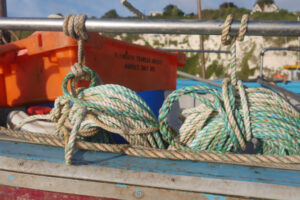 Why we should support small fishing boats over super-trawlers, Part 2
Why we should support small fishing boats over super-trawlers, Part 2
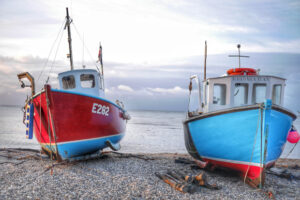 Why we should support small fishing boats over super-trawlers, Part 3
Why we should support small fishing boats over super-trawlers, Part 3
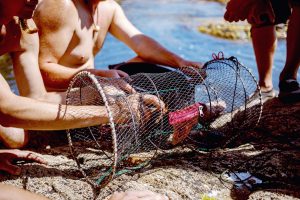 Getting started with fishing for food: Part 3 – Lobster pots
Getting started with fishing for food: Part 3 – Lobster pots
 Community
Community
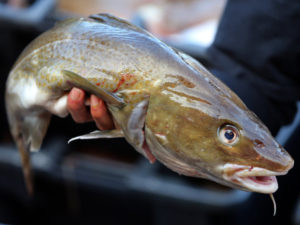 Fishing
Fishing
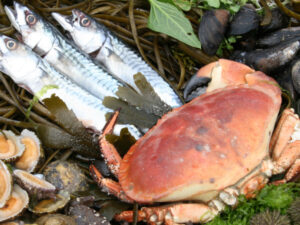 Low-impact seafood
Low-impact seafood
 Commons economy
Commons economy
 Self-employment
Self-employment
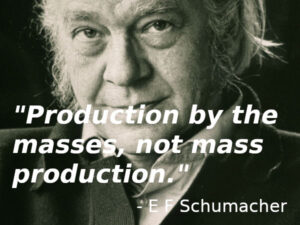 Small is beautiful
Small is beautiful


